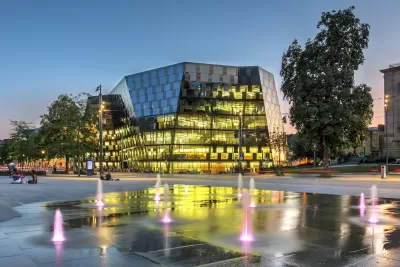A German research team used AI to understand how thermal stress will impact urban infrastructure down to the street level.

A project from the University of Freiburg in Germany assessed how researchers can use artificial intelligence to model the impacts of climate change and calculate ‘thermal stress’ on local infrastructure down to the street level.
According to an article on Phys.org, the model estimates how heat and thermal stress will impact facilities. “In a simulation as well as on the basis of interviews with representatives from various departments of Freiburg's city administration, the researchers also studied where the project's AI-based tools could actually be put to good use in urban planning, what opportunities, risks, and challenges this would involve, and how the tools should be further adapted for practical use.”
The article adds, “The model still needs to be merged with data on the vulnerability of individual urban spaces, but it can already be used now to evaluate urban planning measures such as the unsealing of surfaces. In addition, the researchers developed a novel method for automatically determining where to plant trees in a neighborhood to achieve the maximum reduction of thermal stress.”
FULL STORY: How cities can use AI to adapt to climate change

Maui's Vacation Rental Debate Turns Ugly
Verbal attacks, misinformation campaigns and fistfights plague a high-stakes debate to convert thousands of vacation rentals into long-term housing.

Planetizen Federal Action Tracker
A weekly monitor of how Trump’s orders and actions are impacting planners and planning in America.

In Urban Planning, AI Prompting Could be the New Design Thinking
Creativity has long been key to great urban design. What if we see AI as our new creative partner?

King County Supportive Housing Program Offers Hope for Unhoused Residents
The county is taking a ‘Housing First’ approach that prioritizes getting people into housing, then offering wraparound supportive services.

Researchers Use AI to Get Clearer Picture of US Housing
Analysts are using artificial intelligence to supercharge their research by allowing them to comb through data faster. Though these AI tools can be error prone, they save time and housing researchers are optimistic about the future.

Making Shared Micromobility More Inclusive
Cities and shared mobility system operators can do more to include people with disabilities in planning and operations, per a new report.
Urban Design for Planners 1: Software Tools
This six-course series explores essential urban design concepts using open source software and equips planners with the tools they need to participate fully in the urban design process.
Planning for Universal Design
Learn the tools for implementing Universal Design in planning regulations.
planning NEXT
Appalachian Highlands Housing Partners
Mpact (founded as Rail~Volution)
City of Camden Redevelopment Agency
City of Astoria
City of Portland
City of Laramie





























